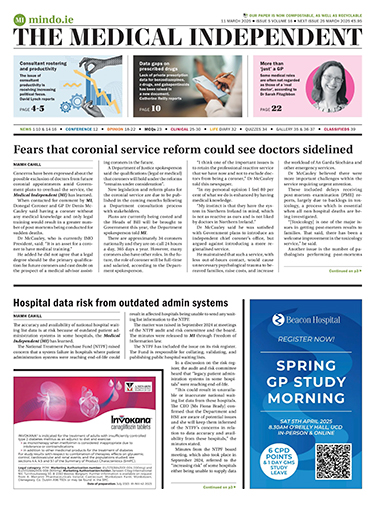A significant number of doctors have expressed their concern to the Medical Council about certain changes to its ethical guide. Catherine Reilly reports
Approximately 300 doctors have signed a letter sent to the Medical Council expressing their alarm at changes to the ‘end-of-life care’ and ‘conscientious objection’ sections in the new guide on professional conduct and ethics. The Medical Independent (MI) understands this correspondence was issued to the Council in mid-January. The ninth edition of the guide, which replaced the version produced in 2016 (and amended in 2019), took effect on 1 January.
The backdrop to these concerns is potential future legal provisions allowing for assisted death – an issue currently being examined by a special Oireachtas committee convened in early 2023 and due to report in March.
Assisted death and euthanasia are illegal in Ireland. The Medical Council’s ethical guide states that doctors have a duty to comply with laws and regulations pertaining to their practice.
The concerns conveyed to the Medical Council primarily relate to two of the changes from the eighth edition. The first is the deletion of the line “you must not take part in the deliberate killing of a patient” from the end-of-life care section. The second relates to the updated section on conscientious objection, particularly the statement that doctors “must” make such arrangements as may be necessary to enable a patient to obtain the required (lawful) treatment (the previous section on conscientious objection stated that if the patient could not arrange their own transfer of care, the doctor “should make these arrangements on their behalf”).
Both the eighth and ninth editions state doctors with a conscientious objection “must” give the patient enough information to enable them to transfer to another doctor to obtain the (lawful) treatment.
The previous guide included a specific section on termination of pregnancy to reflect the 2018 law (which obliges doctors with a conscientious objection to refer), but the new guide does not contain sections on specific areas of care/procedures, except for end-of-life care (see panel on p5).
MI understands there is dismay among many of the concerned doctors that the Medical Council did not highlight the changes to the sections on end-of-life care and conscientious objection in its communications about the new guide. It is also considered that the proposed changes should have been put forward for consultation. The doctors are hoping for a dialogue with the Council and a reconsideration.
While the changes are the focus of significant disquiet, the Irish ethical guide is broadly comparable with that of the UK General Medical Council’s (GMC) core guidance document, Good Medical Practice (the latest edition takes effect on 30 January). The GMC’s core guide does not specifically reference the fact doctors must not take part in the deliberate killing of their patients (assisted death and euthanasia are illegal in the UK). As with the Irish guide, it states doctors must follow the law. However, the GMC core guide signposts its more detailed guidance on end-of-life care, which includes the legal requirements on doctors. Additionally, the GMC has produced a separate guidance document on handling situations when a patient seeks advice or information about assistance to die which outlines the legal context.
In regard to consciousness objection, the GMC core guide states: “If you have a conscientious objection to a particular procedure, you must make sure that the way you manage this doesn’t act as a barrier to a patient’s access to appropriate care to meet their needs. You must follow the guidance in paragraph 88 and our more detailed guidance on Personal beliefs and medical practice.”
The specific guidance on personal beliefs and medical practice includes the line: “If it is not practical for a patient to arrange to see another doctor, you must make sure that arrangements are made for another suitably qualified colleague to take over your role.”
The Irish Medical Council has indicated that certain areas of its guide will be supported by position statements and more detailed guidance in some instances.
Legal duty
Under legislation, the Medical Council is required to publish and review “appropriate guidance on all matters related to professional conduct and ethics” for registered doctors.
The guide outlines general principles that doctors are expected to adhere to and observe, as well as more specific guidance in relation to identified aspects of practice. It is not a legal code, according to the Council.
In 2021, the Council’s ethics committee sought input from doctors and key stakeholder groups regarding review of the eighth edition. A link to a questionnaire was emailed to all registered doctors and additional stakeholders, who were asked to indicate whether or not they were in favour of amendment. Participants could provide free text responses. This consultation process lasted for eight weeks. In June 2022, the Council also held a “targeted” consultation day with key stakeholders in Dublin.
A draft Council document outlining feedback during the public consultation was obtained under Freedom of Information law.
According to this document, there were 568 responses to the consultation questionnaire and the majority (336 or 70 per cent) self-reported as registered doctors. The next most prevalent stakeholder groups were patient respondents and other health professionals. The majority of respondents stated they used the guide in their work (298 or 72 per cent) and that it mostly or always met their needs (72.8 per cent for all respondents; 72.1 per cent for registered doctors). Asked for reasons for not finding the guide useful, participants most frequently reported that there were specific practice or ethical issues not addressed.
When asked if they considered that the guide dealt appropriately and comprehensively with ‘professional values’, just over half (56 per cent or 110) agreed. One-in-three did not agree and 11 per cent (21) were undecided. Some 58 written responses were received from the 66 respondents who did not agree.
Among the latter cohort, the issue of the right to conscientious objection was a key theme.
One respondent stated: “The personal, ethical, and moral values of individual doctors are not safeguarded by real conscientious objection guidance. Ethics also includes respect for the moral and ethical integrity of the doctor.” Such views were primarily related to the guidance on termination of pregnancy, stated the document.
End-of-life care section
In regard to chapter four of the eighth edition (‘Practice’), which covered a wide range of areas including end-of-life care and conscientious objection, 58 respondents agreed with amending the chapter, 44 disagreed and 13 were undecided. In regard to the section on end-of-life care, 41.8 per cent of respondents agreed it required amendment and 58.2 per cent disagreed (the number of respondents and a breakdown of the reasons for their positions were not specified in this document).
In regard to respondents who provided qualitative feedback, most expressed the view that wording around reducing patient suffering “be included” (both the ninth and eighth editions include such wording).
Some respondents suggested the section on end-of-life care would require change pending potential new legislation.
The document noted some “strong” responses with a number of respondents voicing their opposition to any potential introduction of assisted death/euthanasia in Ireland.
“This section should clarify that doctors with sincerely held beliefs who object in conscience and or on evidence-based medical grounds to physician-assisted suicide/euthanasia are not obliged to take part of [sic] facilitate this practice.”
Conscientious objection section
In regard to the section on conscientious objection, 55.7 per cent agreed it required amendment and 44.3 per cent disagreed (the number of respondents and a breakdown of reasons for their positions were not specified in this document).
The majority of those who took the opportunity to provide written responses believed the right to conscientious objection should be strengthened in the guidance.
A respondent who self-reported as a GP said their freedom of conscience had been eroded since the change in ethical guidance following the 2018 law on termination of pregnancy.
“While I respect the will of the Irish people I am concerned my wish not to engage in any way with terminating an unborn infants [sic] life is compromised. I will not prescribe any medication to end a life of the born or unborn and neither do I want to be forced to arrange for any patient who is looking to terminate their pregnancy to go to a practitioner who will carry out that process for them….”
Another respondent said the new guide should ensure doctors are protected with a “robust ‘conscientious objection’ clause”.
“…. The most important principle that needs to be protected in the new guide…is that of the ability of a doctor to ‘consciously [sic] object’ to participating in certain procedures; most notably abortion and euthanasia. This is not currently the case in the revised guide of 2019, specifically s.49. The ability of one to adhere to his or her own conscience and in turn their judgement, goes to the heart of an individual; no less so for a doctor whilst in the course of their duty. The new guide should ensure docctors are protected with a robust ‘conscientious objection’ clause. To do otherwise and effectively ‘force’ doctors to participate in procedures that they find unethical, would be in itself unethical.”
According to the document, it was “common” for respondents to cite the United Nations Universal Declaration of Human Rights – specifically article 18 of the Declaration which specifies that every person has the right to freedom of thought, conscience, and religion.
‘Broadening’ the ethical guide
The Medical Council, indemnifiers, and other organisations have highlighted some of the key changes to the guide on professional conduct and ethics. These include the addition of guidance for doctors acting as expert witnesses; the reframing of open disclosure as an absolute duty following patient safety incidents; changes to reflect the commencement of the Assisted Decision Making (Capacity) Act 2015; and explicit requirements to support continuity of care and safety of patients when transitioning between primary and hospital care.
The new guide no longer includes sections on specific treatments/procedures/interventions (ie, termination of pregnancy, assisted human reproduction, nutrition and hydration). The exception is the (updated) section on end-of-life care.
At the launch in Dublin on 1 November, Council President Dr Suzanne Crowe told the Medical Independent: “We wanted to broaden the view and make the guideline much more high-level.”
Dr Crowe, who chaired the ethics committee, said specific sections on treatment modalities were removed “because most clinical practice is guided by individual guidance from your own postgraduate and training bodies.… The only individual area of practice that we have referenced is end-of-life care.”
Asked if a section on end-of-life care was retained to ensure clarity about its distinction from assisted death, Dr Crowe said it was included to recognise that providing elements of palliative care is every doctor’s duty.
She said the Council received submissions requesting that doctors were reminded of their duty to “support good quality communication” at end-of-life.
“But [also] that the basic principles around palliative care, around pain relief, comfort, knowledge to support [people] – that they are every doctor’s duty. So, it is not a case that you wait to call the palliative care team; as a doctor you can start those steps yourself and you should do so.”
On the issue of assisted death, Dr Crowe said the Council had been “keeping a close eye” on the proceedings of the Oireachtas committee. This parliamentary process was at an early stage, “so we didn’t enter that conversation” in terms of the review of the guide, she said.
Dr Crowe said it was “quite a slim guide” and there were “very discrete areas” that may benefit from more detailed guidance, including end-of-life care.
Worrying
The Medical Council’s new ethical guide was launched on 1 November last. It is understood individual doctors, and a group of doctors with shared concerns, have written to the Council since the launch. The latest correspondence from the group of doctors has accumulated around 300 signatures, and they come from a range of specialties, it is understood.
“‘You must not take part in deliberate killing of a patient’ is a fundamental principle to us [as doctors],” one of the signatories told MI.
In regard to the guide’s stipulation that doctors “must” make such arrangements as may be necessary to enable a patient to obtain the required (lawful) treatment, the doctor said this meant mandatory involvement in a process about which the doctor had ethical concerns. “This is all, of course, in the backdrop of the ongoing debate on assisted dying. Conscientious objection and freedom of conscience is extremely important,” added the doctor, who preferred not to be named.
On 4 January, Professor of Geriatric Medicine Prof Des O’Neill posted on X (formerly Twitter) that the deletion of the line was ethically “tone-deaf”.
Prof O’Neill, who has published widely on medical ethics, communicated his concerns to the Council in November and he is also a signatory to the recent group letter.
In December, Prof O’Neill addressed the Oireachtas committee on assisted dying about the risks posed by potential legalisation, particularly in regard to people with vulnerability. Speaking to MI, Prof O’Neill noted a recent policy statement by the national centre for ethics in Denmark, which he said concluded that “euthanasia and assisted suicide radically alter our vision of each other, of our care for each other, for disability, and for how we age, cannot be regulated and shouldn’t be allowed”.
He said the aforementioned deletion of the line from the ethical guide “really smacks of what we call, in ethics, legalism”.
“This is a retreat to legalism which is an impoverished ethical response to complex ethical situations and really this does not serve either the Medical Council or the medical profession well,” he said.
“I think there is concern about the direction of travel of the Medical Council and ethics committee away from clinical ethics and towards legalism. And so, is that to suggest that if it becomes legal to kill people [through ‘assisted death’ legislation]… then it will be ethical to do so as well?”
He said removing the line when assisted death was the subject of public debate was also, in his view, “professionally tone-deaf.”
According to Prof O’Neill, there have been many instances where liberal democracies instigated laws that were unethical. He said an example is the legal execution of prisoners in the US. Prof O’Neill noted that the American Medical Association’s ethical guide states a physician must not participate in a legally authorised execution.
A Medical Council spokesperson said the guide outlines “general principles” with which doctors are expected to adhere and specific guidance on areas of practice.
The guide states doctors must comply with, and operate within, the law.
The spokesperson said it is illegal for all individuals, including doctors, to take part in the deliberate killing of a person, or to assist a person to end their own life. The removal of the cited line “does not diminish the law”.
As well as being informed by a consultation process, the ethics committee considered existing and newly enacted legislation when drafting the guide.
The Council “welcomes feedback” and has “spoken to a small number of doctors already”.
It will continue to consider the concerns raised.
Language on relationships and bullying changed in new guide
Written feedback during a Medical Council consultation exercise highlighted considerable shortcomings in the tone and language of the eighth edition of the guide on professional conduct and ethics.
According to a Council consultation document, eleven (qualitative) responses were received in regard to a section on ‘relationships between colleagues’, with an emphasis on “the trainee/trainer relationship and senior/junior doctor dynamics”.
The 2019 guide suggested a tacit approval of relationships between trainers and trainees and an equivalence of responsibility, by stating: “Before entering into a sexual relationship, supervisors and their trainees should consider the power imbalance in the relationship and the potential for exploitation or conflicts of interest to arise. They should also consider how the relationship might be viewed by other trainees and the effect these factors may have on the trainee in the future.”
Commenting on this paragraph, a respondent stated: “There should, perhaps, be a clearer prohibition on entering into sexual relationships with trainees, at least while the trainer-trainee relationship is current.”
Another stated: “Relationships should not occur between trainees and their direct line managers. This happens and the outcomes are p*** poor.”
The new guide states that “you should not engage in a sexual or improper relationship with a colleague where there is a significant power imbalance. If you enter a relationship with a colleague, you should be aware of how your behaviour can impact performance within and outside your team.”
The language around workplace bullying and harassment was also critiqued. While the 2019 guide outlined a duty to behave respectfully towards all staff, it merely advised to “avoid” any form of sexual harassment, bullying or undermining of colleagues, particularly when in a position of authority or trust.
This language was referenced in the IMO’s submission: “The guide states that doctors should avoid any form of sexual harassment, bullying or undermining of colleagues, particularly when doctors are in a position of authority or trust, however, a stronger stance from the Medical Council is needed to tackle these issues.”
“Bullying and sexual harassment are unacceptable behaviours that have no place in the medical profession. These behaviours cause stress, anxiety, and loss of self-confidence, impair teamwork, and put patient care and safety at risk. All forms of discrimination, bullying, and sexual harassment must no longer be tolerated.”
The 2024 guide states that doctors “must not” engage in any form of bullying, harassment, abuse, discrimination, undermining of colleagues, or condone such behaviour by others. This applies to all interactions, including on social media and networking sites.
Equality and diversity
The 2019 guide had a section on equality and diversity. This section included a paragraph noting that patients’ cultural backgrounds and ethnicity have an important effect on their health outcomes. “You should try to understand patients’ cultures and respond to their individual needs. You should not discriminate against patients or colleagues on any grounds.” A footnote on the page included reference to the Equal Status Act, 2000.
There were suggestions in the consultation that the passage should be strengthened.
“Should not discriminate implies you have a choice – suggest change to must not discriminate. Suggest address specific cultural requirements and challenges of minority patient groups: BAME, Travellers, Roma, Transhealth etc. The Australian MC [medical council] have similar guidance principles for Aboriginal peoples….”
The new guide states that doctors must never discriminate unfairly against patients or colleagues, and references equal status legislation. This is included as one of the values and principles underpinning good professional practice. There is no longer a section on ‘equality and diversity’.
A section on the consent process includes references to potential patient needs relating to their culture, and ensuring access to appropriate information and supports.
Intimate exams
A number of respondents who provided written responses to the consultation requested that intimate exams be defined. “This section doesn’t define what is an intimate examination. There is uncertainty, with many clinicians feeling this is a genital/anorectal exam….”
The majority of respondents also requested that the language around chaperones be clarified.
One commented: “The use of an untrained relative/family member as chaperone is often suboptimal. In the event of complaint-dispute the prior relationships complicate objectivity. The GMC recommend that the chaperone be a HCP and not a relative….Address (as per GMC) how to proceed when a suitable chaperone is not available (as is common in Irish general practice with sole GP in practice)….”
The new guide states intimate examinations include examinations of breasts, genitalia, and rectum.
The previous guide noted examples of chaperones as a nurse or family member, but the new guide falls silent on who may be an appropriate chaperone.
In the previous guide, doctors were required to offer a chaperone to be present for intimate examinations. However, the guide now states doctors should ask the patient if they would like a chaperone to be present and record their wishes. Consent for intimate examinations must be documented in the patient’s medical record.













Leave a Reply
You must be logged in to post a comment.